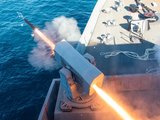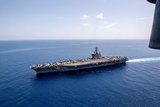AN/AQS-20A sonar set for improvements
Raytheon and the US Naval Undersea Warfare Center (NUWC) are working to improve the capabilities of the US Navy’s AN/AQS-20A minehunting sonar, the company announced on 27 August.
Under a 'work for private party' contract funded by Raytheon, the team is analysing the AN/AQS-20A’s synthetic aperture sonar to improve its ability to capture and process high- and low-resolution images of underwater mines.
The enhancements will enable the sonar to produce better quality images of objects found deep under water to aid in the identification and classification of mines. A series of lab- and sea-based tests will be carried out to evaluate and exercise the sonar's features to optimise the quality of both high- and low-resolution imaging.
The AN/AQS-20A is the variable depth sonar for the AN/WLD-1 Remote Minehunting System (RMS) deployed from the navy’s Littoral Combat Ship (LCS). The system is towed undersea to simultaneously scan the water column for anti-shipping mines forward of, to the sides, and beneath the vehicle. Sophisticated sonar, electro-optical sensors, and high-precision location information are used to provide high-resolution images of mines and mine-like objects.
Kevin Peppe, vice president of Raytheon Integrated Defense Systems' Seapower Capability Systems, said: ‘Extending our long history of collaboration with our NUWC neighbours, this project brings together our respective sonar experts to maximise the performance of a critical undersea warfare capability. Our goal is to build on the system's proven performance and further the advantage that AN/AQS-20A provides to the navy to safely detect and effectively identify these undersea threats.’
More from Naval Warfare
-
![European navies line up $105.8 billion in unawarded contracts for 2026]()
European navies line up $105.8 billion in unawarded contracts for 2026
France, Germany and Italy lead the way on unawarded naval defence opportunities that could be awarded this year, but across Europe countries are ramping up their spending efforts to face geopolitical challenges.
-
![Spain’s F100 upgrade mirrors Aegis modernisation paths in allied navies]()
Spain’s F100 upgrade mirrors Aegis modernisation paths in allied navies
The Spanish Navy’s Alvaro de Bazan-class of air defence frigates will receive the latest Aegis Weapon System technology among other modernisations to extend the service life to 2045.
-
![UK’s Fleet Solid Support ship programme deemed on track despite steel supply concerns]()
UK’s Fleet Solid Support ship programme deemed on track despite steel supply concerns
Shipbuilders are saying the programme is going ahead on time as the government estimates 7.7 million tonnes of steel are needed for 2026 infrastructure projects.
-
![Raytheon unveils details of its proposal for the US Navy/NATO ESSM Next Significant Variant]()
Raytheon unveils details of its proposal for the US Navy/NATO ESSM Next Significant Variant
In an exclusive interview with Shephard, Raytheon’s VP of Shipboard Missiles disclosed what improvements the company plans to offer for the Sea Sparrow NSV.























